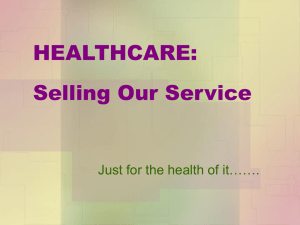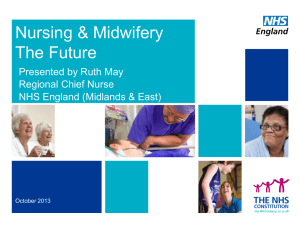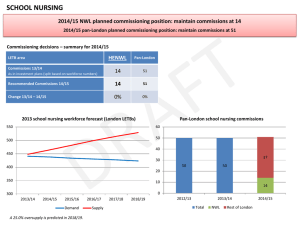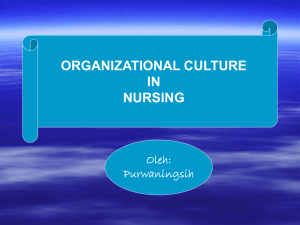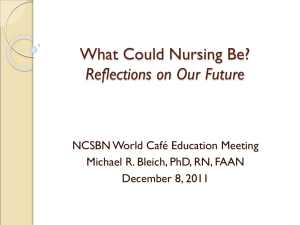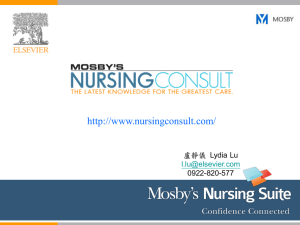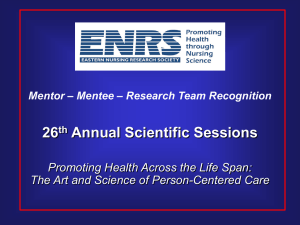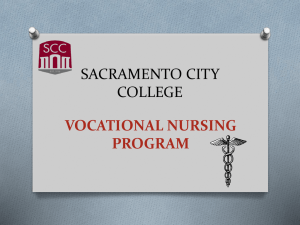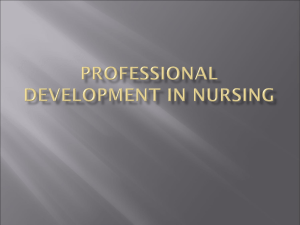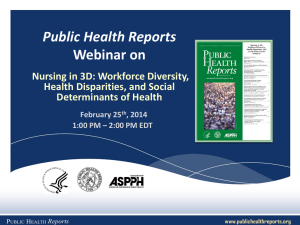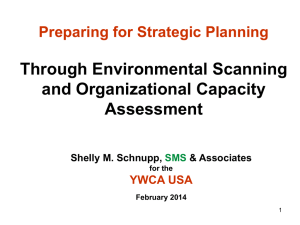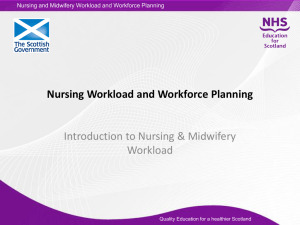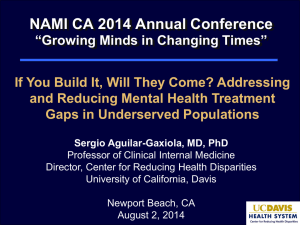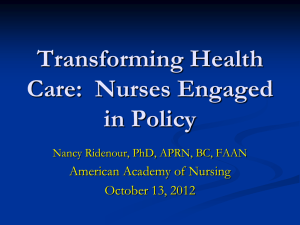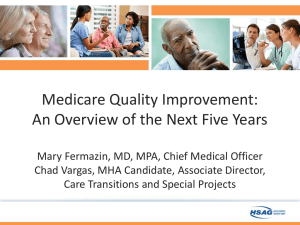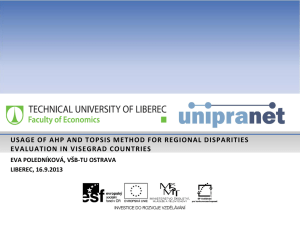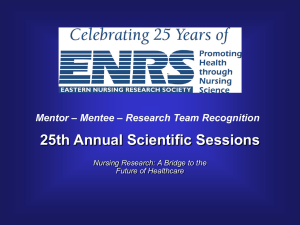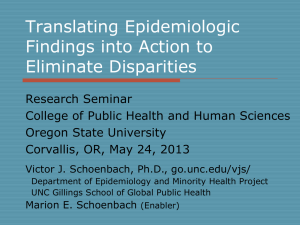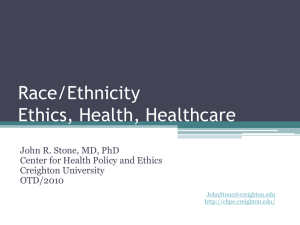2014-09-24_Diversity Learning Collaborative
advertisement
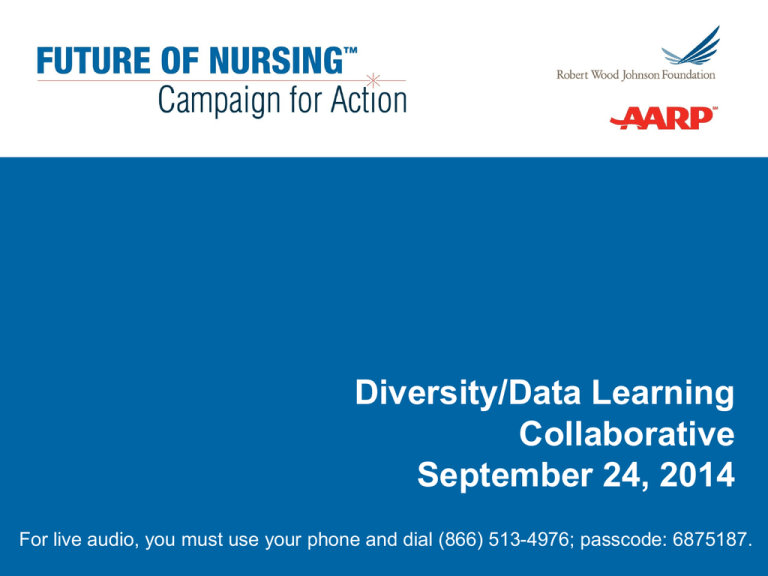
Diversity/Data Learning Collaborative September 24, 2014 For live audio, you must use your phone and dial (866) 513-4976; passcode: 6875187. Welcome Susan B. Hassmiller, PhD, RN, FAAN RWJF Senior Adviser for Nursing; Director, Future of Nursing: Campaign for Action 2 Winifred Quinn, PhD Director, Advocacy & Consumer Affairs Center to Champion Nursing in America 3 Presenter Kenya V. Beard EdD, GNP-BC, NP-C, ACNP-BC, CNE Associate Vice President for Curriculum & Instruction Jersey College, NJ Dir. Center for Multicultural Education & Health Disparities 4 CCNA RESOURCES 5 Co-Chairs, Diversity Steering Committee Antonia Villarruel, PhD, RN, FAAN Professor and Margaret Bond Simon Dean of Nursing University of Pennsylvania School of Nursing Deborah Washington, RN, PhD Director of Diversity for Patient Care Services Massachusetts General Hospital 6 Diversity Consultants Adriana Perez, PhD, ANP-BC Assistant Professor & Southwest Borderlands Scholar Arizona State University, College of Nursing & Health Innovation Barbara L Nichols, DNSc (hon) MS, RN, FAAN Project Coordinator for Wisconsin SIP 7 PARTICIPANT POLL 8 Participant Poll Have you heard of using a strengths-based approach in promoting diversity and inclusion? 1. Yes 2. No 3. Not sure 9 Creating Culturally Inclusive Environments: A Strengths-Based Approach Focus Health Care Disparities Workforce Diversity Culturally Inclusive Environments 11 Agency for Healthcare Research & Quality 2013 National Healthcare Disparities Report – “Gap between best possible care and what is routinely delivered remains substantial across the Nation” – “Some individuals routinely receive poorer quality of care when they can get it” 12 Healthcare Disparities • “Blacks and Hispanics received worse care than Whites for about 40% of quality measures” • “Poor people received worse care than highincome people for about 60% of quality measures 13 14 The Burden of Healthcare Disparities • Undermine the health of society • Detrimental effect on life expectancy • Economic burden (2003-2006 > one trillion dollars) 15 Workforce Diversity 2004 Missing Persons: Minorities in the Health Professions The lack of diversity significantly challenges efforts that seek to improve the quality of our nation’s health care, the delivery of culturally relevant care, and goals of reducing health disparities 2004 IOM In the Nation’s Compelling Interest Greater diversity among health professionals is needed 16 Diversity • A diverse workforce could help remedy the poor quality of healthcare minorities receive • A more diverse nursing workforce will lead to better communication, interaction and treatment for patients of all backgrounds (IOM, 2004) • “The lack of minority health professionals is compounding the nation’s persistent racial and ethnic health disparities” (Sullivan Commission, 2004) 17 Supporting Diversity • NLN: “The case for increasing diversity in the nurse educator workforce in schools of nursing has never been stronger…The higher education community must commit to diverse environments” (2009) • HRSA: “Increase diversity and cultural competence of the nursing workforce” (HHS, 2011) • IOM: “Greater emphasis must be placed on increasing the diversity of the workforce… ensuring that nurses are able to provide culturally relevant care.” (2011) • RWJF: “…the program’s goals include increasing the diversity of the nursing workforce…” (2012) • AACN: “…recruitment of underrepresented groups into nursing is a priority for the nursing profession in the U.S” (2013) 18 THE POWER OF DIVERSITY Executive Order 13583 Our Nation derives strength from the diversity of its population and from its commitment to equal opportunity for all. We are at our best when we draw on the talents of all parts of our society, and our greatest accomplishments are achieved when diverse perspectives are brought to bear to overcome our greatest challenges. Government Wide Diversity & Inclusion Strategic Plan President Obama, 2011 19 Diversity Defined • “Recognizing individual differences in the context of ethnicity and gender. This includes the development of a culture where individuals and institutions move beyond simple tolerance, where they embrace and celebrate the richness of debate and dialogue based on difference… • Seed the ground to cultivate that vibrant culture. It represents an embarkation point for our journey to the richly diverse workforce of faculty, researchers, and pedagogical scholars that can mentor and serve as role models for future nurses and nurse educators from many backgrounds”. NLN’s A Commitment to Diversity, 2009 20 Beyond Diversity • Diversity is key to patient centered care and an integral component of decreasing healthcare disparities. The U.S. Department of Health and Human Services report, A Nation Free of Heath Disparities (2011) • Diversity alone has NOT been enough 21 Creating Inclusive Environments • Create action plans that support diversity, equity (equal) and inclusivity • Seek to recognize and control biases • Collaborate with other coalitions to build inclusive environments • Recognize that power affects how we interact with others • Respect and appreciate difference • Seek opportunities to work with individuals who are different from you • Understand that your reality is a construct that is influenced by your past experiences and that your reality shapes the lens through which you view things 22 Beyond Race, Power & Privilege • Avoiding race related discussions does not dissolve the issues that difference brings • Not seeing one’s race or ethnicity dismisses one’s cultural differences • Acknowledging our differences and our contributions is affirming 23 Strength Based Approach • Deficiency Orientation – Energy focused on remediation, this supports low expectations & a mindset that individuals are deficient – Less time focused on evaluating and improving the system • Difference Orientation – Identify an individual’s strengths and build on it 24 Create a Culture of Inclusivity Diversity is like inviting someone to the dance Inclusivity is like offering them something to eat, giving them a compliment and asking them to dance with you 25 What Stuck? • An ‘Aha’ moment • A pleasant surprise • Something that you had to struggle with to understand • Something that you don’t agree with • Something that you agree with strongly • Something you thought was particularly interesting • Something you didn’t expect • An insight or solution • Something you want to know more about or a question that you have 26 Questions or Comments? Press *1 on your telephone key pad to ask a question OR Use the “chat” feature to send “everyone” a question. You can find the recording and additional webinar resources by going to: www.campaignforaction.org/webinars. 27 Campaign Resources Visit us on the web at www.campaignforaction.org http://facebook.com/campaignforaction www.twitter.com/campaign4action 28
